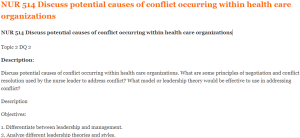NUR 514 Discuss potential causes of conflict occurring within health care organizations
NUR 514 Discuss potential causes of conflict occurring within health care organizations
Topic 2 DQ 2
Description:
Discuss potential causes of conflict occurring within health care organizations. What are some principles of negotiation and conflict resolution used by the nurse leader to address conflict? What model or leadership theory would be effective to use in addressing conflict?
Description
Objectives:
1. Differentiate between leadership and management.
2. Analyze different leadership theories and styles.
3. Analyze characteristics of the professional nurse leader and nursing leadership.
4. Evaluate leadership and management strategies within health care organizations.
5. Discuss potential causes of conflict, principles of negotiation, and conflict resolution models and strategies.
Advanced Practice Nursing: Essential Knowledge for the Profession

Description:
Read Chapters 4 and 27 in Advanced Practice Nursing: Essential Knowledge for the Profession.
Leadership in Nursing Practice: Changing the Landscape of Health Care
Description:
Read Chapters 2-4, 7, and 14 in Leadership in Nursing Practice: Changing the Landscape of Health Care.
Great Leaders Inspire Great Followership
Description:
Read “Great Leaders Inspire Great Followership,” by Cruz, from Leadership Excellence (2014).
Advancing the Nursing Profession Begins With Leadership
Description:
Read “Advancing the Nursing Profession Begins With Leadership,” by O’Neill, from Journal of Nursing Administration
(2013).
From Trait to Transformation: The Evolution of Leadership Theories.
Nursing Leadership From Bedside to Boardroom: Opinion Leaders’ Perceptions
Click here to ORDER an A++ paper from our MASTERS and DOCTORATE WRITERS: NUR 514 Discuss potential causes of conflict occurring within health care organizations
Description:
Read “Nursing Leadership From Bedside to Boardroom: Opinion Leaders’ Perceptions,” by Blizzard, Khoury, and McMurray (2015), located on the Campaign for Action website.
Leadership Styles: Choosing the Right Approach for the Situation
Description:
Read “Leadership Styles: Choosing the Right Approach for the Situation,” located on the Mind Tools website.
Transformational Leadership: Becoming an Inspirational Leader
Description:
Read “Transformational Leadership: Becoming an Inspirational Leader,” located on the Mind Tools website.
Servant Leadership: Putting Your Team First, and Yourself Second
Description:
Read “Servant Leadership: Putting Your Team First, and Yourself Second,” located on the Mind Tools website.
What Is the Difference Between Management and Leadership?
Description:
Read “What Is the Difference Between Management and Leadership?” by Murray (2014), located onThe Wall Street Journal website.
An Alternative Approach to Nurse Manager Leadership
Description:
Read “An Alternative Approach to Nurse Manager Leadership,” by Henriksen, from Nursing Management (2016).
Nurse Manager Skills Inventory
Description:
Complete the “Nurse Manager Skills Inventory,” by the Nurse Manager Leadership Partnership (NMLP), located on the HWE Resources page of the American Association of Critical-Care Nurses (AACN) website. The resource is located under the “Authentic Leadership” heading.
Leadership Style Reflective Essay Assignment Self-Assessment Resources
Description:
NUR 514 Discuss potential causes of conflict occurring within health care organizations Grading Rubric Guidelines
| Performance Category | 10 | 9 | 8 | 4 | 0 |
| Scholarliness
Demonstrates achievement of scholarly inquiry for professional and academic decisions. |
|
|
|
|
|
| Performance Category | 10 | 9 | 8 | 4 | 0 |
| Application of Course Knowledge –
Demonstrate the ability to analyze, synthesize, and/or apply principles and concepts learned in the course lesson and outside readings and relate them to real-life professional situations |
|
|
|
|
|
| Performance Category | 5 | 4 | 3 | 2 | 0 |
| Interactive Dialogue
Replies to each graded thread topic posted by the course instructor, by Wednesday, 11:59 p.m. MT, of each week, and posts a minimum of two times in each graded thread, on separate days. (5 points possible per graded thread) |
|
Summarizes what was learned from the lesson, readings, and other student posts for the week. |
|
|
|
| Minus 1 Point | Minus 2 Point | Minus 3 Point | Minus 4 Point | Minus 5 Point | |
| Grammar, Syntax, APA
Note: if there are only a few errors in these criteria, please note this for the student in as an area for improvement. If the student does not make the needed corrections in upcoming weeks, then points should be deducted. Points deducted for improper grammar, syntax and APA style of writing. The source of information is the APA Manual 6th Edition |
|
|
|
|
|
| 0 points lost | -5 points lost | ||||
| Total Participation Requirements
per discussion thread |
The student answers the threaded discussion question or topic on one day and posts a second response on another day. | The student does not meet the minimum requirement of two postings on two different days | |||
| Early Participation Requirement
per discussion thread |
The student must provide a substantive answer to the graded discussion question(s) or topic(s), posted by the course instructor (not a response to a peer), by Wednesday, 11:59 p.m. MT of each week. | The student does not meet the requirement of a substantive response to the stated question or topic by Wednesday at 11:59 pm MT. |

